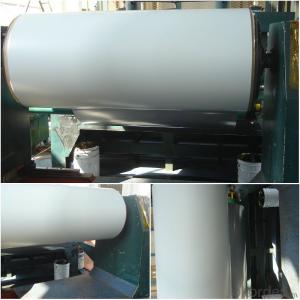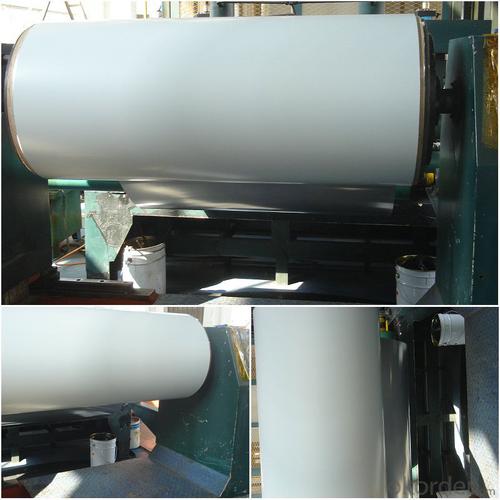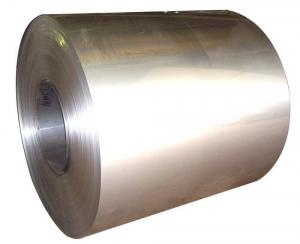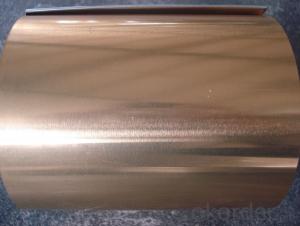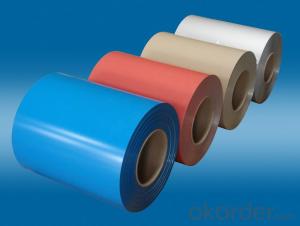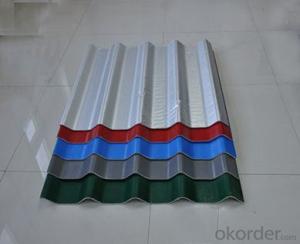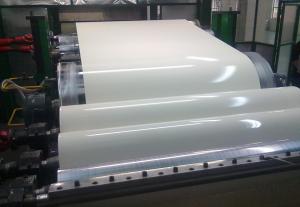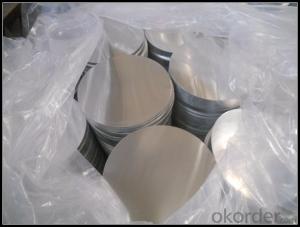Aluminum Coil Racks for White Color PE Coated Aluminum Roofing Sheets
- Loading Port:
- China Main Port
- Payment Terms:
- TT OR LC
- Min Order Qty:
- -
- Supply Capability:
- -
OKorder Service Pledge
OKorder Financial Service
You Might Also Like
PE Aluminum Coating Coils for ACP
Featuresof PE Aluminum Sheet:
1.Adopting precision rolling coating technology, our PVDF and PE coated coil canensure excellent adhesive without coating omission.
2. For thePE coated aluminum coil we produced, there are various colors for your choice.
3. Usinginfrared heating technology to protect environment from pollution.
4. Ourcoated aluminum coil has four-roller coating line, uniform coating thicknessand good features.
RawMaterial of the PE Aluminum Coating Coils:
1. Aluminum Coil: high strength aluminum withalloy of AA1100 (aluminum alloy is available with AA3003, AA3005, AA5005according to customer)
2. Surface Paint: PE, PVDF and specialpaints.
Specification of PE Aluminum Coating Coil
Width: 20mm~1590mm
Thickness: 0.06mm~1.0mm
External Diameter: ≤ 1500mm
Internal Diameter: 405mm, 505mm, 150mm, 75mm
Coil weight: ≤ 4000kg
PE coated aluminum coil is processed throughthe technics of roller coating and baking with precise polyester paints. Itscolor is glossy and with variety of colors enabling you to choose easily.Chromatic aberration is small, impact resistance is strong and easy to beprocessed, and all its performance has reached or surpassed the nationalcriteria. The products are widely used in indoor and door decoration, ceilings,room surface tiles, corrugated boards, wallpanels, advertisement boards, counters, home appliances, decoration in and outof autos and boats.
Performance of thecoating
Aluminum Thickness | Coating Thickness | MEK | T- Bend | Impact | Adhesion | Pencil Hardness | Boiling Water Proof |
0.3-1.5mm | ≥18μm | ≥100 Times | ≤2T | 50 kg•cm | 0 Grade | ≥HB | no change within 2 hours |
0.2-0.28mm | ≥18μm | ≥100 Times | ≤2T | 30kg•cm | 0 Grade | ≥HB | no change within 2 hours |
0.15-0.18mm | ≥18μm | ≥100 Times | ≤3T | 20 kg•cm | 0 Grade | ≥HB | no change within 2 hours |
0.08-0.12mm | ≥16μm | ≥80 Times | ≤4T | 10 kg•cm | ≤1 Grade | ≥HB | no change within 1 hour |
0.022-0.06mm | ≥12μm | ≥50 Times | - | - | ≤1Grade | ≥HB | no change within1 hour |
Color of Card
PE (polyester)
PE
Color Match
For custom' color requests, we can deal as following:
1. Supply a physical sample of custom color. A color sample on metal ispreferred. If other, it is also acceptable. But the color matching rate may benot good as color on metal.
2. New color sample is usually offered by our paint supplier in 5-7 days,special color should be in 7-10 days.
3. Upon receipt of color sample, please approve in writing as soon as possible.Once you approved, we will arrange purchasing and production.
Note: Color difference maybe occurred in different production batch, so it issuggested all panels are placed in one order for same project. And keep samedirection as arrow on protective film when installing to avoid any colordifference by vision
- Q: Can aluminum coils be used in corrosive gas environments?
- Yes, aluminum coils can be used in corrosive gas environments. Aluminum is known for its excellent corrosion resistance, especially in atmospheric conditions. It forms a protective oxide layer on the surface that protects the metal from further corrosion. However, it is important to note that aluminum can be susceptible to certain corrosive gases, such as chloride and sulfur compounds. In such cases, additional protective measures, such as surface treatment or coating, may be necessary to ensure the longevity and performance of the aluminum coils in corrosive gas environments.
- Q: How are aluminum coils cleaned before further processing?
- To guarantee the elimination of any contaminants or impurities, aluminum coils undergo a series of steps for cleaning prior to further processing. The cleaning process entails the utilization of chemical solutions and mechanical techniques. Initially, the coils are immersed in a degreaser or cleaning solution to dissolve and eradicate any oils, greases, or dirt present on the surface. This stage is essential in eradicating organic contaminants that may hinder subsequent processes. Following the soaking, the coils typically undergo a high-pressure water rinse to eliminate any remaining residues or particles. This step aids in dislodging and flushing out loosened contaminants from the coil surface. In certain instances, a combination of chemical cleaning and mechanical scrubbing or brushing may be employed to effectively eliminate stubborn or baked-on contaminants. This method is particularly beneficial for coils exposed to harsh environmental conditions or industrial processes. Once the coils have been cleaned, they are typically rinsed again to ensure complete removal of any cleaning agents or residues. This is crucial to prevent any adverse effects or interference with subsequent processing stages. Overall, the cleaning of aluminum coils prior to further processing plays a vital role in achieving high-quality end products. It ensures impurity removal, enhances the surface finish, and improves the overall performance and lifespan of the finished aluminum products.
- Q: Can aluminum coils be used in food storage facilities?
- Aluminum coils are capable of being employed in food storage facilities. The food industry extensively employs aluminum due to its exceptional properties, including its lightweight nature, durability, resistance to corrosion, and effective heat conductivity. These attributes render aluminum coils suitable for a variety of applications within food storage facilities. Refrigeration systems, air conditioning units, and food storage cabinets are just a few examples of where aluminum coils can be utilized. Furthermore, aluminum is non-toxic and has no adverse reaction with food or its flavor, thus establishing it as a secure option for food storage. However, it is crucial to ensure that the aluminum coils used in food storage facilities undergo proper cleaning and maintenance to prevent any potential contamination.
- Q: What are the advantages of using aluminum coils in various industries?
- There are several advantages of using aluminum coils in various industries. Firstly, aluminum is a lightweight material, which makes it easier to handle and transport. This is particularly beneficial in industries such as aerospace and automotive, where reducing weight is crucial for improving fuel efficiency and overall performance. Secondly, aluminum has excellent corrosion resistance properties. It forms a natural oxide layer that protects it from rust and other forms of corrosion, making it durable and long-lasting. This makes aluminum coils suitable for applications in industries such as construction, marine, and HVAC, where exposure to moisture and harsh environments is common. Additionally, aluminum has high thermal conductivity, which means it can efficiently transfer heat. This makes it ideal for use in heat exchangers, refrigeration systems, and other applications where effective heat dissipation is required. Moreover, aluminum is a highly recyclable material, and the recycling process requires significantly less energy compared to the production of primary aluminum. Using aluminum coils in industries promotes sustainability and reduces environmental impact, making it an attractive choice for companies aiming to adopt eco-friendly practices. Furthermore, aluminum coils can be easily formed and shaped into various sizes and dimensions, allowing for flexible design options and customization. This versatility makes it suitable for a wide range of applications in industries such as packaging, electrical, and telecommunications. Lastly, aluminum coils offer cost advantages in terms of initial investment and maintenance. Although the upfront cost may be higher than other materials, the long-term benefits of durability, low maintenance requirements, and energy efficiency make it a cost-effective choice. In conclusion, the advantages of using aluminum coils in various industries include its lightweight nature, corrosion resistance, high thermal conductivity, recyclability, versatility, and cost-effectiveness. These qualities make aluminum coils a preferred material for many industrial applications, contributing to improved performance, durability, and sustainability.
- Q: How are aluminum coils inspected for quality control?
- To maintain quality control, aluminum coils undergo a thorough examination employing visual inspections and various non-destructive testing methods. These measures guarantee that the coils conform to the necessary specifications and are devoid of any flaws or defects. In order to identify surface defects, including scratches, dents, and irregularities in shape or size, trained personnel meticulously scrutinize the coils. Additionally, inspectors check for signs of contamination, oxidation, or discoloration. If any abnormalities are detected during this visual inspection, they are promptly noted and addressed. Apart from visual inspections, internal quality evaluation of the aluminum coils is conducted through non-destructive testing techniques. One commonly employed method is ultrasonic testing, which involves transmitting high-frequency sound waves through the coils. The reflected sound waves are then analyzed to detect internal defects such as voids, cracks, or delaminations. This technique allows for a comprehensive assessment of the coil's integrity without causing any harm to the material. Another non-destructive testing method used for quality control is eddy current testing. This technique induces electrical currents in the coils and measures the resulting magnetic fields. Any variations in the magnetic fields can indicate flaws or defects in the aluminum, such as cracks or inclusions. Eddy current testing is particularly effective in identifying surface defects and discontinuities. Furthermore, measurements of crucial physical properties such as thickness, width, and flatness are taken to ensure compliance with the required standards. Specialized instruments like micrometers, calipers, or laser scanners are typically employed for this purpose. In conclusion, the inspection process for aluminum coils encompasses a combination of visual inspections and non-destructive testing methods. This comprehensive approach guarantees that the coils are fault-free, meet the necessary specifications, and exhibit superior quality.
- Q: We have all heard the Us saying aluminum and their euro counterparts saying aluminium. I assumed this was just a small difference in culture or location. But, while reading my chemistry book (Chemistry the Central Science 12th) i came across a section saying: Cations formed from nonmetal atoms have names that end in -ium: NH4+ ammonIUM ion, H3O+ hydronIUM ion. So, i have came up with a hypothesis, could it be possible that when the periodic table was coming together, the aluminium was changed to aluminum to allow the rules to work? Thus making aluminum the correct spelling? Give me your thoughts.
- It just depends on which side of the Atlantic Ocean you live. Come to think of it though, most metals end in ium. Not just the ions.
- Q: Are aluminum coils suitable for weather-resistant applications?
- Yes, aluminum coils are suitable for weather-resistant applications. Aluminum is known for its excellent corrosion resistance, making it a popular choice for outdoor and weather-exposed applications. The metal forms a protective oxide layer on its surface when exposed to air, which acts as a barrier against moisture, humidity, and other weather elements. This oxide layer helps prevent the metal from rusting or deteriorating over time. Additionally, aluminum's lightweight nature and high strength-to-weight ratio make it a practical choice for various weather-resistant applications, such as roofing, gutters, siding, and outdoor signage.
- Q: How are aluminum coils used in rainwater harvesting systems?
- Aluminum coils are commonly used in rainwater harvesting systems for their durability and efficient heat transfer properties. These coils are typically installed within the rainwater storage tanks and are connected to a heat exchanger system. The primary function of the aluminum coils in rainwater harvesting systems is to facilitate the heating or cooling of the stored rainwater, depending on the intended use. For instance, if the harvested rainwater is intended for domestic use, such as for showers or laundry, the aluminum coils can help heat the water to a desired temperature. On the other hand, if the harvested rainwater is intended for cooling purposes, such as air conditioning or industrial processes, the coils can help cool the water as well. The aluminum coils are designed in a way that maximizes the surface area exposed to the rainwater, allowing for efficient heat transfer. This means that the coils can rapidly absorb or release heat, depending on the needs of the system. The aluminum material used for these coils is preferred due to its high thermal conductivity, corrosion resistance, and lightweight properties. Additionally, the coils are also beneficial in preventing the growth of bacteria and algae within the rainwater storage tanks. Aluminum has natural antimicrobial properties that inhibit the growth of these organisms and ensure the harvested rainwater remains clean and safe for use. Overall, aluminum coils play a crucial role in rainwater harvesting systems by enhancing the usability of the collected rainwater through efficient heat transfer and maintenance of water quality.
- Q: what is the final temperature of 250g of water whose initial Temperature is 25 C if 80-g of aluminum initially at 70 C is dropped into the water? The specific heat of aluminum is 0.215 cal/C g how do you do it? our teacher did not show us how and it is not in the book
- Given Data :-- Mass : Aluminium m(a) = 80 g, Water m(w) = 250 g Initial Temperature : Aluminium t? = 70 C and Water t?' = 25 C Final Temperature of both ( aluminium and water ) = T C (assume) Since Aluminium is initially at a temperature higher than that of water, it (aluminium) will lose heat to water . Heat lost by Al = Q = mass of Aluminium x sp.heat capacity of Aluminium x Temp. change = Q = 80 x 0.215 x ( 70 - T ) cal Heat gained by water = Q' = mass of water x sp.heat capacity of water x Temp. change = Q' = 250 x 1 x ( T - 25 ) According to principle of calorimetery . = Heat lost by aluminium = heat gained by water. = 250 x 1 x ( T - 25 ) = 80 x 0.215 x ( 70 - T ) = T = 27.9 C .... ( Rounded to one decimal place )...... Answer Answer .
- Q: Can aluminum coils be recycled multiple times?
- Aluminum coils possess the remarkable ability to be recycled numerous times. This is due to the fact that aluminum is an exceptionally recyclable substance, and its quality remains unaltered throughout the recycling process. As a result, aluminum coils can be melted and reshaped into fresh coils on multiple occasions, without experiencing any deterioration in their performance or characteristics. The act of recycling aluminum not only aids in the preservation of natural resources, but it also conserves a significant amount of energy compared to the production of new aluminum using raw materials. Consequently, opting for aluminum coils is a sustainable and eco-friendly decision, as they can be recycled multiple times.
Send your message to us
Aluminum Coil Racks for White Color PE Coated Aluminum Roofing Sheets
- Loading Port:
- China Main Port
- Payment Terms:
- TT OR LC
- Min Order Qty:
- -
- Supply Capability:
- -
OKorder Service Pledge
OKorder Financial Service
Similar products
Hot products
Hot Searches
Related keywords
